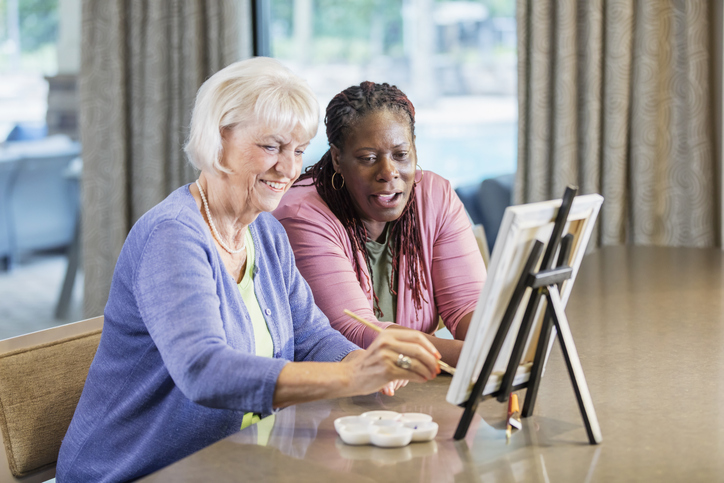
For many family caregivers, alleviating anxiety for dementia patients is an important goal.
Rapid mood swings are hallmarks of dementia, and can be very difficult for family caregivers to navigate. One moment you are taking part in an enjoyable activity together, when seemingly out of thin air, the senior’s demeanor darkens. You could then end up walking on eggshells in an effort to resolve an issue you don’t fully grasp. That’s why alleviating anxiety for dementia patients is an important goal for many family caregivers.
Though it’s useful to find out the root cause behind strong emotions like fear, agitation, and anxiety, unfortunately, it is not always possible. There may be a known trigger, such as loud noises or fatigue, that can easily be taken care of; but there may be more arbitrary factors, such as the senior recollecting an upsetting memory from decades ago that they are not able to discuss. Utilizing sensory activities can help restore calm for older adults with dementia.
What Should I Do Now?
After establishing that the older adult is not in pain or physical discomfort, there are two important steps to take:
- Journaling: Keep a notebook close by while caring for the senior. Record the date, time, and any other details relating to an occurrence of agitation. For instance, note whether the senior had just woken up, had just finished having dinner, hadn’t used the bathroom for a few hours, was watching the news on television, etc. The time of day is specifically important to write down, as those with dementia often suffer from more anxiety in the late afternoon and evening. The goal of journaling is to look for commonalities and patterns to help you prevent future occurrences.
- Diversion/Redirection: After recognizing the feelings the senior is experiencing, it is often beneficial to move into a different area of the home (or even to go outside if the weather is nice enough) and shift the focus to something pleasurable. If it’s been some time since breakfast, a mid-morning snack on the front porch might help. If the senior is wandering or pacing, try going out for a walk around the block or to the park. Sometimes, listening to favorite music can offer a sense of calm. Try different strategies and document the results in your journal for future reference.
Engaging the Senses
Sensory exercises can help with alleviating anxiety for dementia patients and preempt or provide distraction from challenging mood swings. Try creating and implementing one or more of these creative ideas from our experts in elder care in Concord, NH and nearby areas:
- Scented Cards: Cut strips of cardboard and attach aromatic items in small sealed plastic baggies to one end. Use various scents that bring to mind memories or a feeling of calm: cinnamon, vanilla, peppermint, pine needles, chocolate, coffee, suntan lotion, etc. Use your imagination and talk about each fragrance while enjoying them together.
- Aquarium Bag: Fill a large zip-locked plastic bag with water beads and a variety of small plastic marine animals, plants, etc. Utilize this idea as a springboard to other sensory bags with different themes in accordance with the senior’s specific interests.
- Homemade Paint: Make up a batch of this safe, nontoxic paint to keep easily accessible, which can be used for either finger painting or brush painting. Mix together ½ c cornstarch and 2¾ c cold water in a pan. Cook and stir over medium heat until it boils. Stir 1 envelope of unflavored gelatin into ½ c of cold water and add to the cornstarch and water. Allow the mixture to cool, and then split up into different containers, adding different colors of food coloring to each.
Want More Ideas?
Our professionals in elder care in Concord, NH and the surrounding communities are full of creative ideas like these, in addition to the skill to help successfully handle even the most difficult signs and symptoms of the disease. Our intent is always to make life the best it can be for the seniors we serve, every day. Call Live Free Home Health Care at 603-217-0149 to find out more.
